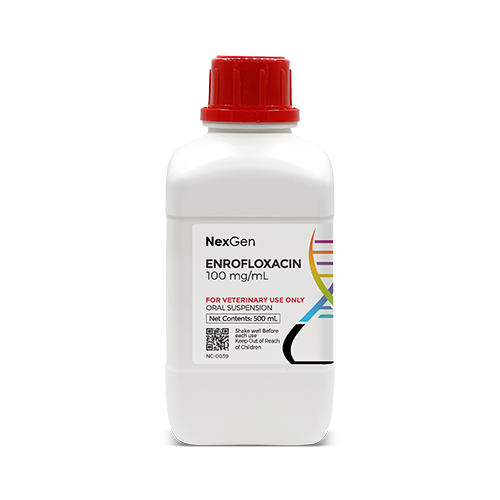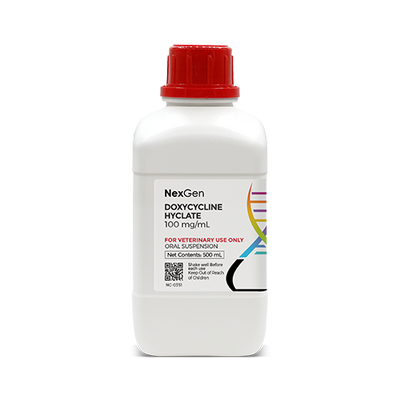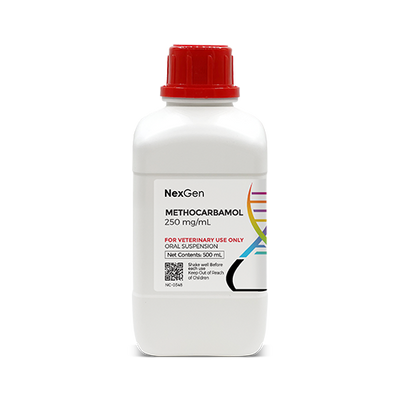
Enrofloxacin 100 mg/mL, Oral Suspension, (500mL)
Login for pricing
- Brand
- Mixlab
- SKU:
- NC-0039
- Product Type:
- Suspension
- Size:
- 500ml
- Administration:
- Oral
- Therapeutic Class:
- Antibacterial, Fluoroquinolone
The bacteria in the environments most horses occupy can number in the billions per square inch.1 Most of these bacteria are harmless, some are beneficial, while yet others are harmful bacteria known as pathogens. The latter can cause disease under the right circumstances, such as when a horse’s structural or immune defenses are compromised. Some normally benign bacteria can also become infectious under the right circumstances. For example, normally harmless coliform bacteria found in manure can infiltrate a fresh wound and cause an infection.1
Like humans and other mammals, the horse’s immune system is capable of neutralizing most bacterial infections on its own. But given the aforementioned circumstances, infection can and does occasionally occur. Further, the inflammatory process can do damage to adjacent healthy tissues. Some infections and diseases can become exacerbated and produce devastating consequences, such as septic arthritis.
Horses can be affected by bacterial pathogens that infect their blood, lungs, intestines, reproductive systems, urinary tract, mammary glands, skin, muscles or joints. Some common bacterial diseases affecting horses include:
Strangles—This is a highly contagious disease of the equine upper respiratory tract caused by the bacterium Streptococcus equi.
Potomac Horse Fever—This disease is caused by the parasite Neorickettsia risticii and is characterized by fever, laminitis, edema, severe diarrhea and occasionally, death.
Endotoxemia—is caused by the presence of endotoxins in a horse’s blood resulting from certain types of bacteria in the gut that have breached the gut wall and entered the bloodstream.
Tetanus—Caused by the bacteria Clostridium tetani, this disease is occurs when the bacteria enter the horse’s body through wounds. It can cause spasms, high fever, violent reactions to sudden movement or noise and even death from asphyxiation.
Intestinal Bacterial Infections—These can be caused by any number of bacterial agents and most often present with diarrhea. The most common infectious cause of diarrhea in horses is salmonella.
Prevention and Treatment
Good sanitary practices and health regimens are key to prevention however, the primary method of addressing bacterial infections once they’ve set in is to eliminate (kill) the organisms and render the environment in which they’re growing (the horse’s body) inhospitable. In the case of open wounds, this will translate into cleaning the affected area, creating drainage, getting rid of dead tissue and applying local antiseptics. As in humans, some systemic bacterial infections can resolve on their own as well. In other cases however, more decisive action must be taken.
Today, veterinarians can choose from a wide array of antibiotic drugs to kill bacteria (bactericidal) or impede their metabolism or multiplication (bacteriostatic) to assist in fighting infection.1 Over the last several decades, researchers have developed purified forms of naturally-occurring antibacterials and synthetic versions of these drugs. More efficient ways of using these medications have been devised, as well as new methods of combining different agents to increase their efficacy.
Where to buy Enrofloxacin
Enrofloxacin is available in the U.S. through several pharmaceutical manufacturers and through veterinary custom compounding companies.
Enrofloxacin carries numerous potential drug interactions. Please consult your veterinarian prior to beginning any treatment regimen.
FOR RX ONLY: A valid prescription from a licensed veterinarian is required for dispensing this medication.




















